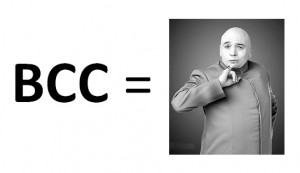Once upon a time, a long long tim e ago, when I was very young, like, 11 years old, I used to sometimes BCC people in emails. For me to use BCC required two conditions to exist:
e ago, when I was very young, like, 11 years old, I used to sometimes BCC people in emails. For me to use BCC required two conditions to exist:
- I sent something to person X, but I also wanted person Y to be aware of me sending the information to X and-
- Either one of the following:
- It was important to me that X isn’t aware that Y knows about it or-
- I thought it wasn’t important that X knows about Y knowing about it, and I didn’t want to add Y to a conversation whereby he’ll start receiving reply-to-alls.
Quite trivial, I know, that’s the purpose of BCC.
When I started working for my previous boss, one of the things he explicitly told me was “never use BCC as long as you work for me, and I recommend that you never use BCC at all, ever”. I thought I was smart, so I asked “is it because sometimes when people are BCCd they reply-to-all, embarrassing the original sender?” – “No”, he said, “it goes much deeper”.
And then he told me something that sticks with me since, one of the smartest things I’ve heard. He said “When someone sends you an email where you’re BCCd, your brain tags that person as someone who sometimes BCCs people in emails. So next time he sends you an email where you’re NOT BCCd, your brain will wonder whether he BCCd anyone on this email that he doesn’t want you to know about. As a consequence, your brain will automatically tag this person as someone who may have something to hide, and you’ll develop a concern for the level of honesty and transparency of that person. With time, you may grow not to trust him. Don’t be that person. If you send someone something and you want me to be aware of that, just forward me the email after you send it, and do that with everyone else.”
Beyond agreeing with his point, what I loved about this analysis is that it was based entirely on the perception of the other side. One of the most important things in product management, in marketing, and in fact in anything, is the ability to put yourself in the other person’s shoes, and be able to imagine his train of thought, both conscious and unconscious. If you’re smart enough, you’ll be able to understand what the major pitfalls in your behavior are, leading that person to think bad thoughts about you (or your product).
So I’ve never used BCC since, I tell this story to all my employees, and I forward many emails after I send them. Which on my iPhone is a huge pain (because of the time it takes the Sent Items folder to sync before I can forward).
Which leads me to the purpose of this post: please consider this a cry for help to all those developing mobile email clients, web email services, desktop email clients, email-related browser plugins, etc:
Please give me the ability to add to each email a list of people to whom the email will be forwarded after it is sent. Want a cool idea? Give me the option to replace BCC with a “forward-after-send” option, so I can use the existing BCC field in the email client, but some plugin or other magic will pull out the BCC and forward the email to each person in the BCC box after the email is sent. But wait! Will such a feature defeat the purpose and make forwarding an email after sending it “the new BCC”? In which case the whole story I told above will start being relevant for forward-after-send as well? I don’t know, we’ll have to try. In the meanwhile, please help. I’m in pain here.
Thank you,
A devout email user



Pingback: From “hero” to “traitor” in one e-mail | dcvikram()
Pingback: Professional Development – 2015 – Week 8()
Pingback: BCC Is Evil | A blog - Read Me.()